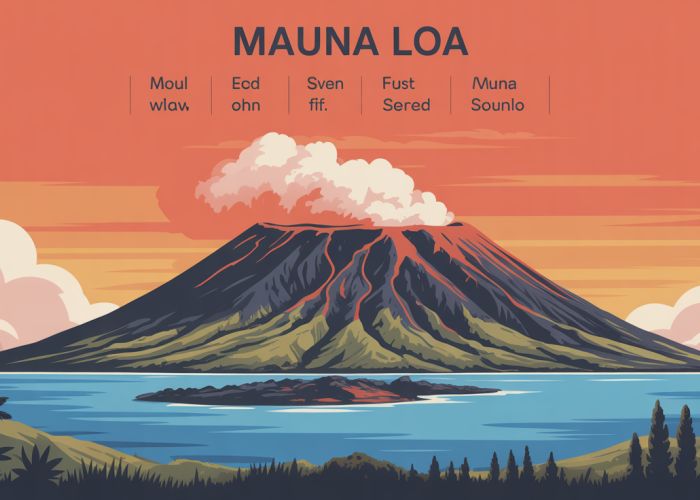Understanding the correct mauna loa pronunciation can be challenging, especially considering its significance to the field of Volcanology. The vast Mauna Loa Observatory, a vital institution for atmospheric research, derives its name from this majestic volcano. The Hawaiian language, known for its melodic sounds, holds the key to accurate mauna loa pronunciation. Local experts, like cultural educators, often emphasize the importance of respecting indigenous language protocols when learning about place names. Mastering mauna loa pronunciation is therefore a journey into both geological science and cultural appreciation.

Deconstructing the "Mauna Loa Pronunciation: Finally Get It Right! [Guide]" Article Layout
The ideal article layout for a guide titled "Mauna Loa Pronunciation: Finally Get It Right!" needs to be structured logically and clearly, prioritizing user comprehension and providing multiple avenues for learning the correct pronunciation. The core focus is on effectively teaching the pronunciation of "mauna loa pronunciation."
1. Introduction: Hook and Establish Relevance
- Hook: Start with a captivating opening line that acknowledges the common difficulty in pronouncing "Mauna Loa." This could be a relatable anecdote about mispronunciations or a surprising statistic about the volcano.
- Context: Briefly introduce Mauna Loa – its significance as a volcano and its location (Hawaii). Avoid overwhelming the reader with scientific details at this stage; keep it simple and engaging.
- Problem Statement: Clearly articulate the problem: many people struggle to pronounce "Mauna Loa" correctly.
- Promise: State the article’s objective: to provide a clear, concise, and easy-to-follow guide to mastering the "mauna loa pronunciation."
- Keyword Inclusion: Naturally incorporate "mauna loa pronunciation" in the introduction, establishing its relevance to the content. For example: "Struggling with the mauna loa pronunciation? You’re not alone! This guide will finally help you get it right."
2. Breaking Down the Name: Syllable-by-Syllable
This section is crucial for dissecting the word into manageable phonetic components.
2.1. Syllable Separation
- Visually break down the name into syllables: Mau – na – Lo – a.
- Emphasize the importance of understanding syllable division for accurate pronunciation.
2.2. Individual Syllable Pronunciation
- "Mau":
- Provide phonetic transcriptions (e.g., /maʊ/). If possible, explain the phonetic alphabet symbols used.
- Offer a common-word analogy (e.g., "Sounds like ‘cow’").
- Include an audio clip of this syllable being pronounced in isolation.
- "na":
- Phonetic transcription (e.g., /nɑː/).
- Analogy (e.g., "Similar to the ‘na’ in ‘nautical’").
- Audio clip.
- "Lo":
- Phonetic transcription (e.g., /loʊ/).
- Analogy (e.g., "Like the beginning of ‘low’").
- Audio clip.
- "a":
- Phonetic transcription (e.g., /ɑː/).
- Analogy (e.g., "Like the ‘a’ in ‘father’ – with a longer sound").
- Audio clip.
2.3. Combining Syllables
- Guide the reader on blending the syllables together smoothly.
- Provide an audio clip of the complete name pronounced slowly and clearly.
- Emphasize maintaining the correct pronunciation of each individual syllable when combining them.
3. Common Mistakes and How to Avoid Them
This section proactively addresses potential pronunciation pitfalls.
3.1. Stress Placement
- Explain which syllable(s) should be emphasized (in this case, arguably the first syllable).
- Illustrate incorrect stress placement examples:
- Incorrect: Mau-NA-Lo-a
- Correct: Mau-na-Lo-a
- Audio examples contrasting correct and incorrect stress.
3.2. Vowel Sounds
- Address common mispronunciations of vowel sounds. For example:
- Confusing the "au" in "Mau" with a short "a" sound.
- Shortening the "a" in "na" and "a".
- Provide specific guidance on how to correct these mistakes.
3.3. Rushing the Pronunciation
- Advise against rushing through the name. Encourage the reader to enunciate each syllable clearly.
- Include an audio example of the name pronounced too quickly.
4. Practice Exercises and Tips
This section empowers the reader to actively practice and improve their pronunciation.
4.1. Repetition Drills
- Suggest repeating the name aloud multiple times, focusing on accuracy.
- Offer variations:
- Slow repetition
- Normal-speed repetition
- Repeating after an audio clip
4.2. Contextual Practice
- Suggest using the name in sentences related to the volcano or Hawaii.
- Example sentence: "I’ve always wanted to visit Mauna Loa."
- Encourage the reader to record themselves and compare their pronunciation to the audio examples provided.
4.3. Resources and Further Learning
- Link to reputable online pronunciation dictionaries or resources (e.g., Forvo, Merriam-Webster).
- Recommend listening to native Hawaiian speakers pronouncing the name.
- Caution against relying on unreliable sources for pronunciation guidance.
5. Cultural Sensitivity
- Acknowledge the importance of pronouncing the name correctly out of respect for Hawaiian culture and language.
- Briefly explain that Hawaiian language is valued and should be treated with care.
- This section reinforces the importance of accurate pronunciation beyond just technical correctness.
Mauna Loa Pronunciation: Frequently Asked Questions
Still struggling with how to say Mauna Loa? Here are some common questions answered to help you nail the pronunciation.
What exactly does "Mauna Loa" mean?
"Mauna Loa" literally translates to "Long Mountain" in Hawaiian. Understanding this helps you appreciate its immense size and maybe even remember the correct mauna loa pronunciation.
Is it "Mow-na Low-a" or "Maw-na Loa-a"?
Neither is exactly correct. The most accurate mauna loa pronunciation emphasizes three distinct syllables: "Mau-na Lo-a." Listen to audio examples to get the rhythm right.
Why is proper pronunciation important?
Respect for the Hawaiian language and culture is key. Making an effort to say "Mauna Loa" correctly demonstrates respect for the islands and its people. It shows you value the local culture.
I keep mispronouncing it! Any quick tips?
Focus on separating the three syllables. Think: "Mau" like the beginning of "Maui," "na" like "nah," and "Lo-a" as it reads. Practice saying "Mauna Loa" slowly at first, then speed up. Listen to Hawaiian speakers to get the feel for the intonation and mauna loa pronunciation.
So, you’ve conquered the *mauna loa pronunciation* challenge! Awesome job! Now you can impress your friends with your newfound knowledge of this incredible volcano. Go forth and share your linguistic skills…and maybe plan a trip to see it for yourself someday!